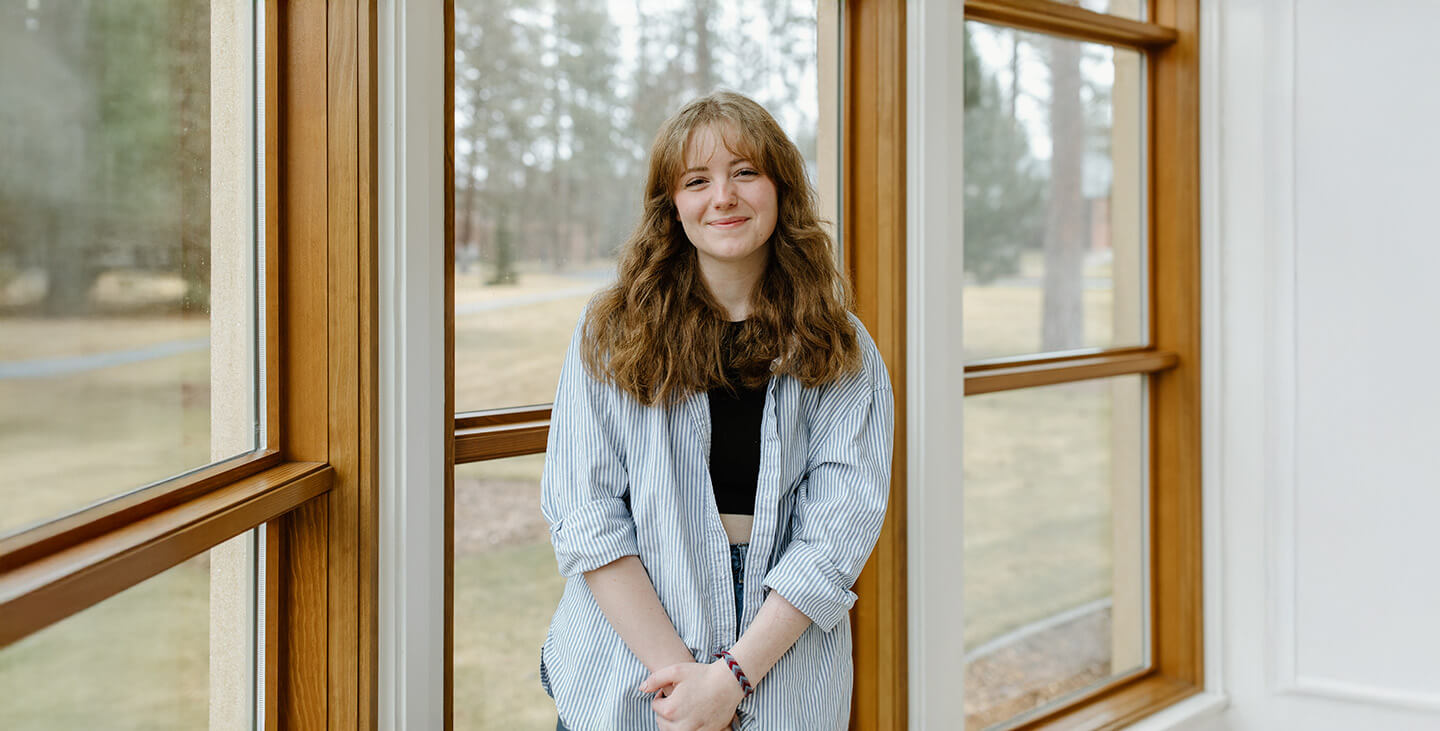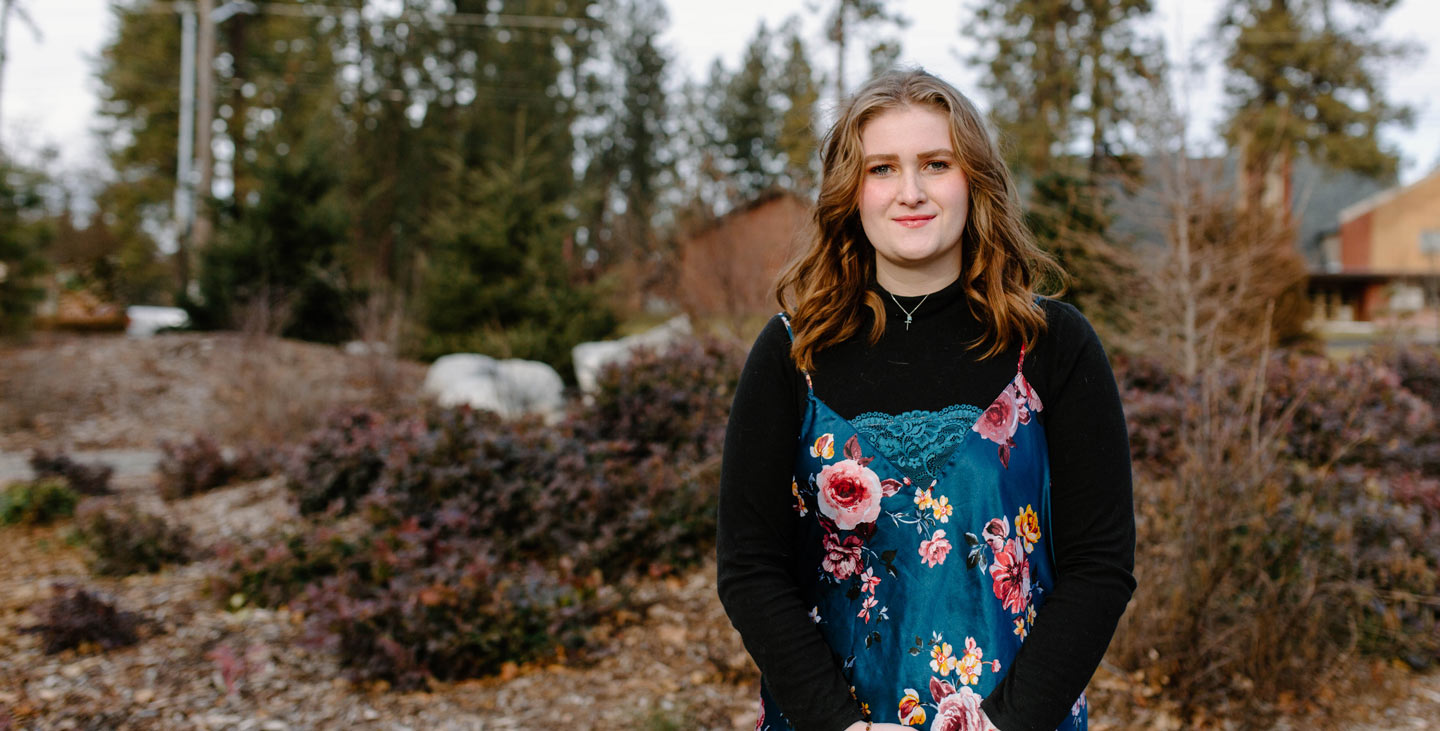Philosophy
 Stella Palmisano '27
Stella Palmisano '27
Majors: Philosophy and Psychology
Why did you decide to study philosophy?
I attended a private, religious high school, and many of my teachers had backgrounds in philosophy. They had me reading Plato as a 14-year-old, and it just… made sense. Not so much the pure reading, but more the questions being asked. What does it mean to live a good life? Why are we here? Why, really, should I do what is good? What even is "good?" These questions are what pester me (in the best, and sometimes worst, ways), and philosophers are the people who ask them.
What classes have been your favorite so far?
I took an ethics class and a metaphysics class in concurrence with each other, and it was so engaging; metaphysics is the basis of philosophy and philosophical beliefs, while ethics is like the "action plan" of philosophy. Getting to investigate the metaphysical implications of ethical theories – and vice versa – was so invigorating. Those two subjects specifically connect so many dots for me in my application of philosophy.
Tell us about a unique experience you've had or project you've worked on for your major.
I had the opportunity to write a 10- to 15-page critique of a philosophical paper and create a presentation on it for my epistemology class. I had chosen to critique an argument about trust and friendship, and I am so proud of that project. Philosophy can be so meticulous, but my professor, Dr. [Rebecca] Korf, aided me in growing the skills to pick apart these complex arguments and challenge pieces of them with a respectful but sharp bite.
What advice would you give to someone thinking about majoring in philosophy?
It is pretty cliche, but, ask so many questions. I feel like "I have no idea what is going on" is a pretty common experience for students studying philosophy. But this is why you learn in community; this is not a subject you can study well alone. There is a reason people dedicate their lives to understanding these writings and aiding us in understanding and discussing them as well.
What's something that might surprise other students about your major?
If you have these existential questions, these questions that gnaw at you and keep you up at night, if you want to know what is true, philosophy is probably not going to give you that answer. And that can be SO frustrating and confusing. But this has become one of my favorite parts of my major. Philosophy will not present you with the answer; it will give you the tools to continue to ask these questions and approach them with humility and curiosity.
What's your dream job?
I would love to become a therapist, perhaps specializing in trauma. And, though this clearly relates to my psychology major, my philosophy major is something I see as invaluable to what I will bring to my job. All you do is ask questions. All you do is explore your thoughts and listen to others' with generosity (if you are doing it right). You spend your time challenging both others' ideas and your own. These are exactly the kinds of skills I want to foster and bring into my field.
Who are three people who have made a difference for you at Whitworth?
Dr. Keith Wyma is our resident ethicist and chair of the philosophy department. He is someone who just… gets it. He has shown me how integral this study of ethics is and interacts with the ideas so intimately that you can see just how much they matter (I guess there is a reason I am now an ethics minor). I have never walked into a classroom and felt so welcomed when I had/have Dr. [Mark] Baird. He is so intentional with how he interacts with us students and makes you feel like you are a genuinely valued individual. You are not just another face in his class. Finally, my sweet Melaina. She is a fellow second-year philosophy major, and she has been so impactful to me just through her humble but insatiable curiosity. She has shown me what it means to engage in philosophy, and do it well.
Why did you choose to attend Whitworth?
I chose to attend Whitworth based on my visit over Honors Scholarship Weekend. I felt so welcomed. As someone from Southern California, I probably should have felt super out of my element... literally. But I just felt like my presence was wanted and valued on this campus, which provided a feeling of comfort that I did not experience with any other university.
How would you describe Whitworth?
This just goes hand-in-hand with my previous answer. Whitworth is welcoming. We want you here, we want to know your name, we want to know what you are passionate about. Whitworth wants to know who you are!
 Eleanor Jeffers '24
Eleanor Jeffers '24
Why did you decide to study philosophy?
I decided to study philosophy after taking a particularly impactful moral philosophy and psychology class during my senior year of high school. Philosophy is a unique field in that many of the answers we are searching for remain unsolved over thousands of years. I love being part of a field that has such a rich history of thinkers and is continually expanding with new ideas. My decision to be a philosophy major has only been reinforced by the excellent variety of classes available and the opportunities for teaching assistantships, independent studies and publishing of my personal work.
What class has been your favorite so far, and why?
During my freshman year, I took C.S. Lewis and absolutely loved it. We were given the opportunity to read most of C.S. Lewis' major works, as well as the entire Narnia series. I admire Dr. Baird's commitment to making the class a space to discuss difficult topics like suffering and the problem of evil in a way that meets students where they are. Dr. Baird, like all of our philosophy professors, is genuinely invested in his students and works to be sensitive to the particular struggles that college students experience. It was with his kindness, mentorship and friendship that I navigated my first semester of school successfully despite some difficult personal issues.
Tell us about a unique experience or project you’ve worked on for your major.
I am a member of Whitworth's Ethics Bowl team, a debate-like program where we analyze real-world cases and decide on the most ethical approach to them. We've had cases ranging from healthcare robots to lab-grown meat to the removal of dams around the American Southwest. Ethics Bowl has given me an unbelievable mental catalogue of different theories and thinkers, which is indispensable when it comes to doing work for my classes. It has also provided me with the skills necessary for argument and constructive debate; I think in our current world it is more important than ever to know what you believe and to have an ethical grounding for that belief.
What advice would you give to someone thinking about majoring in philosophy?
I truly think that everyone should take a philosophy class and that far more people should major or minor in it as well. Philosophy offers the opportunity to complete philosophical research about a specific and niche topic, but can also be combined with other majors with relative ease. Additionally, philosophy underscores all other fields in various ways; as my professors always say, ethics and politics rest on epistemology and metaphysics. Understanding essential debates in philosophy has given me better insight into everything from quantum physics to religion.
What’s your dream job?
In an ideal world, I would be able to combine my two potential career paths: being a philosopher of ethics and being a civil rights lawyer. Though I have a deep drive to make a concrete impact on the lives of individuals disenfranchised in our country through legal work, I also have a love for philosophy that I am hesitant to put on the sidelines. I'm still trying to figure out a path that will combine both of those things
Who are three people who have made a difference for you at Whitworth?
Dr. Keith Wyma has made an incredible impact on how I communicate through his work as our Ethics Bowl coach. He fosters a bond between our teammates and lets us grapple with the cases on our own time. He challenges our beliefs only until he knows that we've thought them through fully, and then he communicates a deep respect for us as independent thinkers. Dr. Forrest Baird has impacted me in a similar way, letting me work through my emotions on tough topics and always offering his opinion only when it's asked for. He consistently works to ensure the success of his students in class and in life, and is quick to offer a kind ear when someone needs extra support. My peer Logan Bateman, my first friend at Whitworth, has been present in many of my interactions with both Dr. Wyma and Dr. Baird. I love that Logan doesn't let me get away with being lazy in argument or belief, and that he is consistently encouraging while holding me to a high standard. Though many of my peers are exceptionally impressive as people and as academics, Logan is the sort of person who is field-defining, world-changing and life-impacting. I appreciate his friendship more than I could ever communicate to him.
Why did you choose to attend Whitworth?
I chose to attend Whitworth because it is so radically different from my hometown of Columbus, Ohio. The only Midwestern thing about Whitworth is the friendliness displayed by the student body. Otherwise, Whitworth is far more aesthetically beautiful and far closer to nature, and offers excellent opportunities to get into the outdoors. Besides the academics, one of the primary reasons I have stayed at Whitworth and loved being here is the outdoor recreation program. Outdoor rec has allowed me to rock climb outdoors, to lead other students on backpacking trips through North Idaho, and even to summit Mount Hood during my freshman year.
What is something that has surprised you about your major?
What is most surprising about the philosophy major at Whitworth is the sheer caliber of our professors. Their hard work, thoughtfulness, careful engagement with hard and controversial topics, and academic charity towards all views makes the philosophy department one of our strongest. I know very few college students who could say with certainty that they want to keep in touch with every professor in their department after graduation, and yet that sentiment is shared among every single philosophy student here.
 Celeste Riley-Norman '23
Celeste Riley-Norman '23
Why did you decide to study philosophy?
When I first came to Whitworth I had no idea that I would end up being a philosophy major. I came in my freshman year as a psychology major and I was certain that was what I wanted to major in, but then I ended up in an Intro to Philosophy class my first semester and loved it. I was excelling in the class and ended up having coffee with the professor. I talked to him about my career goals and about the class and he told me that I should consider becoming a philosophy major. At first, I just added it as a minor, but then I took another philosophy class and loved it even more. I began to speak with some of the professors in the philosophy department and realized that I really wanted to be a philosophy major.
What are some of your favorite classes so far?
I've loved every philosophy class I've been in – not just because of the content, but because of the professors. Philosophy is a subject where the way in which it is presented is very important, and I've been lucky to have amazing professors who make every class I take my new favorite.
Tell us about a unique experience you've had or project you've worked on for your major.
I took a logic class, and during our symbolic logic unit I was able to solve a logic proof in a way that our professor previously thought was not possible. I loved this experience because I was able to prove something in a new way.
What advice would you give to someone thinking about majoring in philosophy?
Do it. Philosophy is something that you can do almost anything with. Philosophy teaches you critical thinking, how to understand complex arguments and ideas, how to express yourself both orally and through writing, as well as logical decision-making. Do not let this idea of "what are you even going to do with a philosophy major" stop you from studying it. Philosophy is a major that gives you tools for life and is very useful for a lot of jobs, especially if you plan to further your education after undergrad. You can go into business, law, politics, analytics, etc. I like to think of philosophy as building a base. It is a major that I feel gives you the building blocks for life. If you are thinking about majoring in philosophy and you already know that you love it or at least enjoy it, absolutely do it, and if you do not really know anything about it but you are still thinking about it, then take a class, talk to the professor, actively engage with the material. I promise it will be worth it, even if you don't decide to major in it.
What's your dream job?
My dream job is to be a lawyer; I want to practice criminal prosecution. I know that philosophy is going to help me with that because law is all about, logic, argumentation, ethics and being able to argue effectively. Philosophy majors have the highest Law School Admission Test scores because we spend four years learning those exact things.
Who has been an important connection for you at Whitworth, and why?
An important connection for me at Whitworth has been my Intro to Philosophy professor, Dr. Orozco. He was the one who pushed me to do philosophy. I know that he is thinking not just about my success as an undergrad, but also my success later in life. It is wonderful to know that you have someone who is thinking about how to help you succeed and keeping you in mind for new opportunities.
What's something that surprised you or might surprise other students about your major?
Philosophy is so broad; there are many different types of philosophy. I assumed that philosophy was mostly about ethics and the meaning of life. However, philosophy is more about answering big questions, logic, and providing the best answer to things, whether those questions are about metaphysics, ethics, religion, human existence, knowledge, etc. Philosophy is so much more than what most people assume it is.